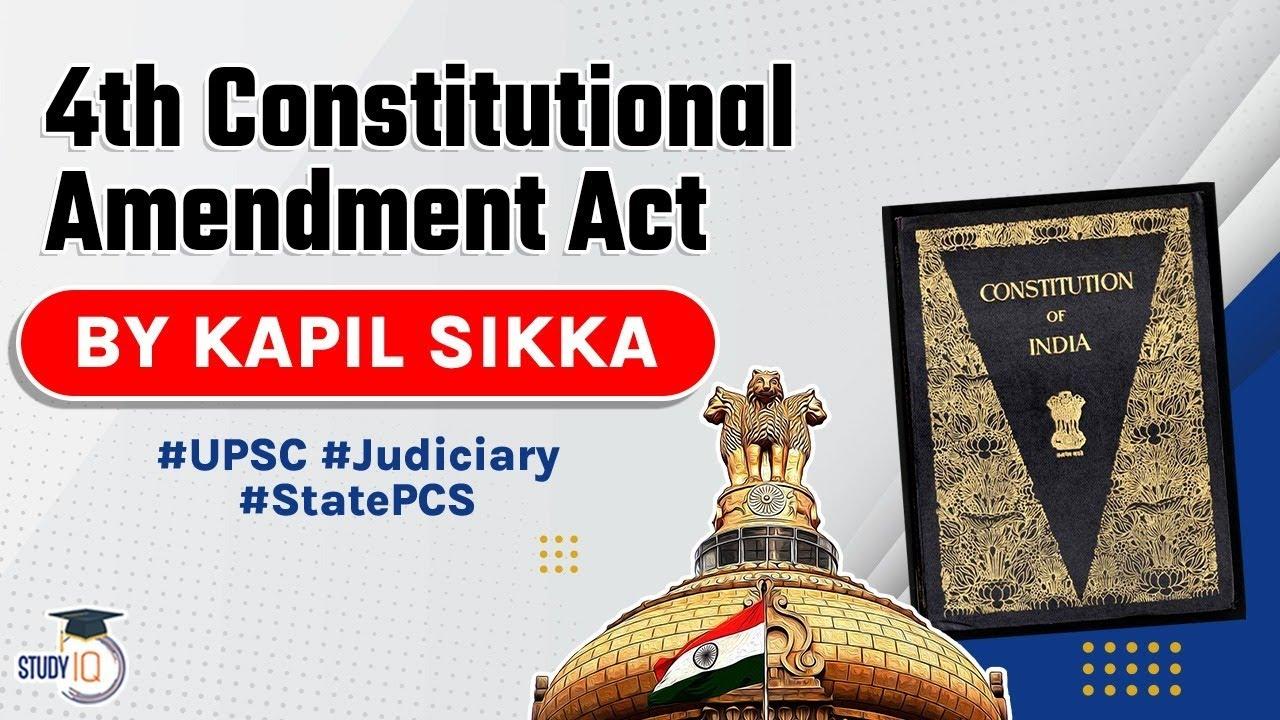Table of Contents
4th Amendment

Purpose
- Amend articles 31, 31A and 305 of, and the Ninth Schedule to, the Constitution.
Art 31
- Compulsory acquisition of property – (1) No person shall be deprived of his property save by authority of law.
- (2) No property shall be compulsorily acquired or requisitioned save for a public purpose and save by authority of a law which provides for acquisition of the property for an amount which shall be fixed by such law; and no such law be called in question in any curt on the ground that the amount so fixed is not adequate.
- In Kameshwar Singh v State of Bihar,
- the Bihar Land Reforms Act, 1950 was held invalid under the Article 14 for it classified the zamindars in a discriminatory manner for the purpose of compensation.
- The Central Government added into the Constitution, a new provision – Article 31A providing for the acquisition by the state of any estate or of any rights therein, or for the extinguishing or modifying any such rights, no law would be void on the ground of any inconsistency with any of the fundamental rights contained in the Articles 14, 19 and 31
- Art 31A Saving of laws providing for acquisition of estates- Not withstanding any thing contained in Art 13, no law providing for
- (a) the acquisition by the state of any estate or any rights therein
- Shall be void on the ground that it is inconsistent with or takes away or abridges any fundamental rights
- (2) Estate’ means any land held or let for purposes of agriculture
- The deprivation of property referred to in clause (1) is to be construed in the widest sense as including any curtailment of a right to property.
- Even where it is caused by a purely regulatory provision of law and is not accompanied by an acquisition or taking possession of that or any other property right by the State, the law, in order to be valid according to these decisions, has to provide for compensation under clause (2) of the article.
- While the abolition of zamindaris and the numerous intermediaries between the State and the tiller of the soil has been achieved for the most part, our next objectives in land reform are the fixing of limits to the extent of agricultural land that may be owned or occupied by any person, the disposal of any land held in excess of the prescribed maximum and the further modification of the rights of land owners and tenants in agricultural holdings.
- The proper planning of urban and rural areas require the beneficial utilisation of vacant and waste lands and the clearance of slum areas.(iii) In the interest of national economy the State should have full control over the mineral and oil resources of the country, including in particular, the power to cancel or modify the terms and conditions of prospecting licenses, mining leases and similar agreements.
- This is also necessary in relation to public utility undertakings which supply power, light or water to the public under licenses granted by the State.
- A recent judgment of the Supreme Court in Saghir Ahmed v. the State of U.P. has raised the question whether an Act providing for a State monopoly in a particular trade or business conflicts with the freedom of trade and commerce guaranteed by article 301, but left the question undecided.
- Clause (6) of article 19 was amended by the Constitution (First Amendment) Act in order to take such State monopolies out of the purview of sub-clause (g) of clause (1) of that article,
- but no corresponding provision was made in Part XIII of the Constitution with reference to the opening words of article 301
Fourth Amendment Act 1955
- Amendments:
- Made the scale of compensation given in lieu of compulsory acquisition of private property beyond the scrutiny of courts.
- Authorised the state to nationalise any trade.
- Included some more Acts in the Ninth Schedule.
- Extended the scope of Article 31 A (savings of laws).


Latest Burning Issues | Free PDF






















 WhatsApp
WhatsApp